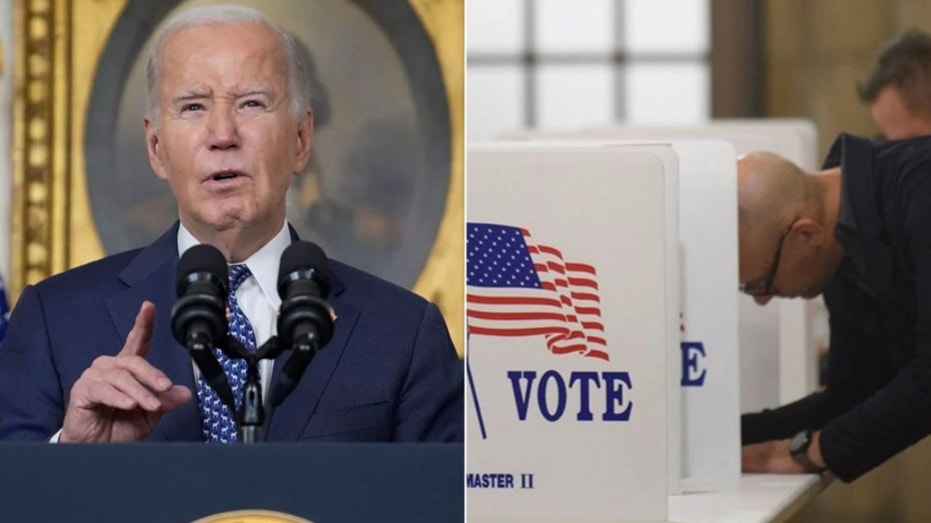A bill meant to bolster school safety by allowing school districts to hire retired law officers or military veterans to work as armed guardians won passage in the Kentucky Senate on Tuesday.
The measure is the latest attempt by Kentucky lawmakers to augment school security since the tragic 2018 shooting at Marshall County High School in western Kentucky, where two students were killed and more than a dozen others were injured when another student opened fire.
The bill cleared the GOP-led Senate on a 28-10 vote and goes to the House. The proposal, sponsored by Republican Sen. Max Wise, is designated as Senate Bill 2 — reflecting its priority status in the Senate.
UTAH BILL ENCOURAGING TEACHERS TO GET FIREARMS TRAINING, CARRY ON CAMPUS PASSES LEGISLATURE
The Senate passed another bill that would allow Kentucky voters to choose who serves on the state’s board of education. The measure would strip governors of the authority to select most board members.
The school safety bill would allow local school boards to hire and assign guardians at schools. Their hiring would be optional for local boards. Districts could employ as many guardians as administrators deem necessary. The guardian program would begin in the 2025-26 school year if the bill becomes law.
Guardians could fill the void at schools lacking armed school resource officers — typically members of local law enforcement agencies — or they could serve alongside SROs. Hundreds of school campuses are without SROs due to insufficient funding or lack of available officers, Wise has said.
“The school resource officer, though, is first and foremost the hiring goal that we want for our Kentucky public schools,” Wise said during the Senate debate. “But the guardian is a well-measured approach that may fit a school district’s need.”
Wise said the bill in no way waters down or removes any previous actions by the legislature to bolster school security in the wake of the Marshall County shooting.
Democratic Sen. Reginald Thomas said the bill won’t resolve the core problems leading to gun violence.
“Rather than saying how can we deal with the gun problem that we have here in this state and in America, our answer is let’s put more guns in schools, not less,” he said.
Those eligible to serve as guardians would include honorably discharged military veterans, retired state troopers, retired law enforcement officers and former federal agents.
Their preparation would include the first level of school resource officer training, as well as training on firearms proficiency and how to respond to active shooter situations. They would be allowed to carry concealed weapons on school grounds.
Opponents of the bill also raised concerns about the level of training for guardians.
Republican Sen. Stephen West, in supporting the bill, said time is crucial in active shooter situations.
“What it came down to for me is, would I rather have a trained, armed veteran on site ready to act or would I rather have a highly trained SRO or law enforcement officer five minutes away,” he said. “That’s the choice we have.”
Republican Sen. Whitney Westerfield said the focus should be on expanding the number of SROs.
“I regret that we’re doing this instead of appropriating the money for the districts to hire the SROs they need,” he said. “I would like for us to do that.”
Wise has expressed hope that additional funding to deploy school resource officers will be included in the next two-year state budget plan that lawmakers will finalize later in the legislative session.
The bill also includes mental health segments. It would increase suicide prevention awareness and training for teachers and students and expand the scope of student support. It would foster a team approach among school psychologists, social workers, school resource officers and mental health providers.
In other action Tuesday, the Senate passed a bill that would change the way members of the state Board of Education are selected. Instead of appointment by the governor with confirmation by the Senate, the board members would be elected by the voters.
The measure cleared the Senate on a 24-14 vote to advance to the House. Under the bill, two state school board members would be elected from each of the state’s seven Supreme Court districts.
“Senate Bill 8 gives the voters the chance to make important choices about who is making the broad policy decisions about the education of their children and all of Kentucky’s youth,” said Republican Sen. Mike Wilson, the bill’s lead sponsor.
Democratic Sen. Cassie Chambers Armstrong opposed the measure, saying there’s no evidence that switching their selection to partisan elections would improve educational outcomes among students.
“I believe that party politics have no place in our Kentucky classrooms,” she said.



